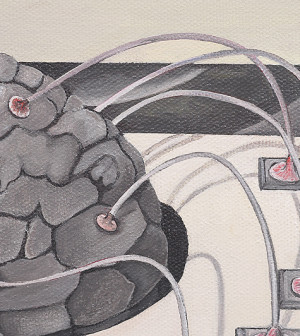- Could Your Grocery Store Meat Be Causing Recurring UTIs?
- Are You Making This Expensive Thermostat Error This Winter?
- Recognizing the Signs of Hypothyroidism
- 10 Strategies to Overcome Insomnia
- Could Artificial Sweeteners Be Aging the Brain Faster?
- Techniques for Soothing Your Nervous System
- Does the Water in Your House Smell Funny? Here’s Why
- Can a Daily Dose of Apple Cider Vinegar Actually Aid Weight Loss?
- 6 Health Beverages That Can Actually Spike Your Blood Sugar
- Treatment Options for Social Anxiety Disorder
Scientists Watch Imagination at Work in the Brain


Researchers say they’ve tracked specific activity in the human brain linked to imagining.
It hasn’t been clear whether imagination and memory were distinct processes, so a team from Brigham Young University in Provo, Utah, decided to explore the issue.
“I was thinking a lot about planning for my own future and imagining myself in the future, and I started wondering how memory and imagination work together,” study co-author Stefania Ashby said in a university news release.
“I wondered if they were separate, or if imagination is just taking past memories and combining them in different ways to form something I’ve never experienced before,” she explained.
The researchers used MRI scans to monitor brain activity in volunteers while they did tasks that required either memory or imagination.
The results showed that there were distinctive brain patterns for the two processes within an area of the brain that’s long been tied to memory, the hippocampus.
“We were able to see the distinctions even in those small regions of the hippocampus,” said Ashby. “It’s really neat that we can see the difference between those two tasks in that small of a brain region.”
The study was published recently in the journal Cognitive Neuroscience.
Ashby was a student at Brigham Young University when she conducted the study with Brock Kirwan, an assistant professor of psychology and neuroscience. Ashby is now a research associate at the University of California, Davis.
More information
The Stanford Encyclopedia of Philosophy has more about imagination.
Source: HealthDay
Copyright © 2026 HealthDay. All rights reserved.










